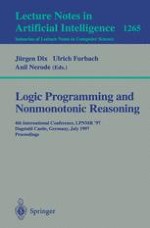1997 | ReviewPaper | Chapter
Strong and weak constraints in disjunctive datalog
Authors : Francesco Buccafurri, Nicola Leone, Pasquale Rullo
Published in: Logic Programming And Nonmonotonic Reasoning
Publisher: Springer Berlin Heidelberg
Included in: Professional Book Archive
Activate our intelligent search to find suitable subject content or patents.
Select sections of text to find matching patents with Artificial Intelligence. powered by
Select sections of text to find additional relevant content using AI-assisted search. powered by
This paper presents an extension of disjunctive datalog (Data-log∨,⌝) by integrity constraints. In particular, besides classical integrity constraints (called strong constraints in this paper), the notion of weak constraints is introduced in the language. These are constraints that are satisfied if possible. The semantics of weak constraints tends to minimize the number of violated instances. As a consequence, weak constraints differ from strong constraints only if the latter are unsatisfiable. Weak constraints may be ordered according to their importance to express different priority levels. The formal definition of the semantics of weak constraints is given in a general way that allows to put them on top of any existing (model-theoretic) semantics for Datalog∨,⌝ programs. A number of examples shows that the proposed language (call it Data-log∨,⌝, c) is well-suited to represent complex knowledge-based problems, such as, for instance, NP optimization problems.A detailed complexity analysis of the language is given as well as an algorithm for the computation of the stable model semantics of Datalog∨,⌝c programs.
